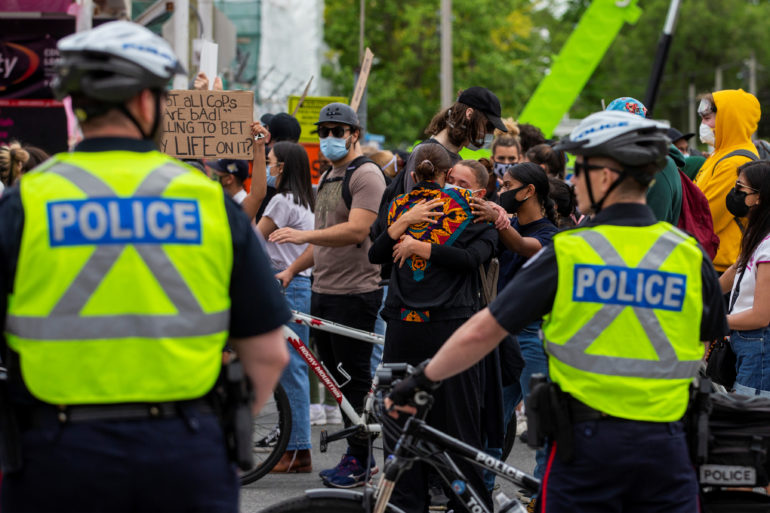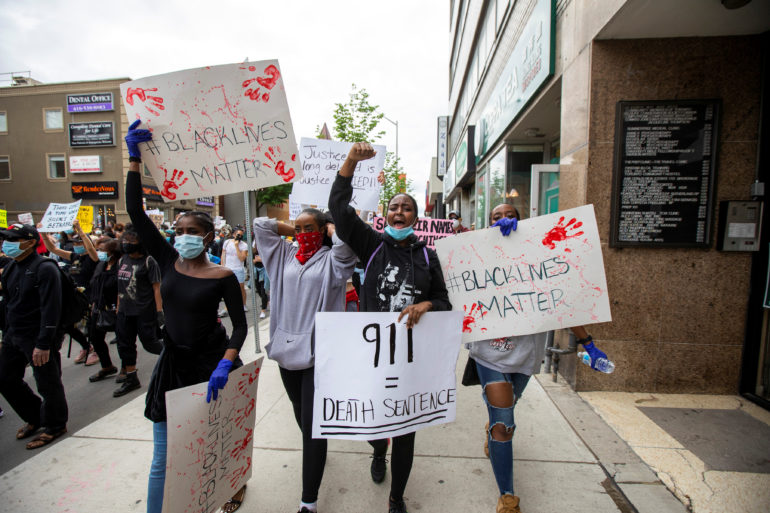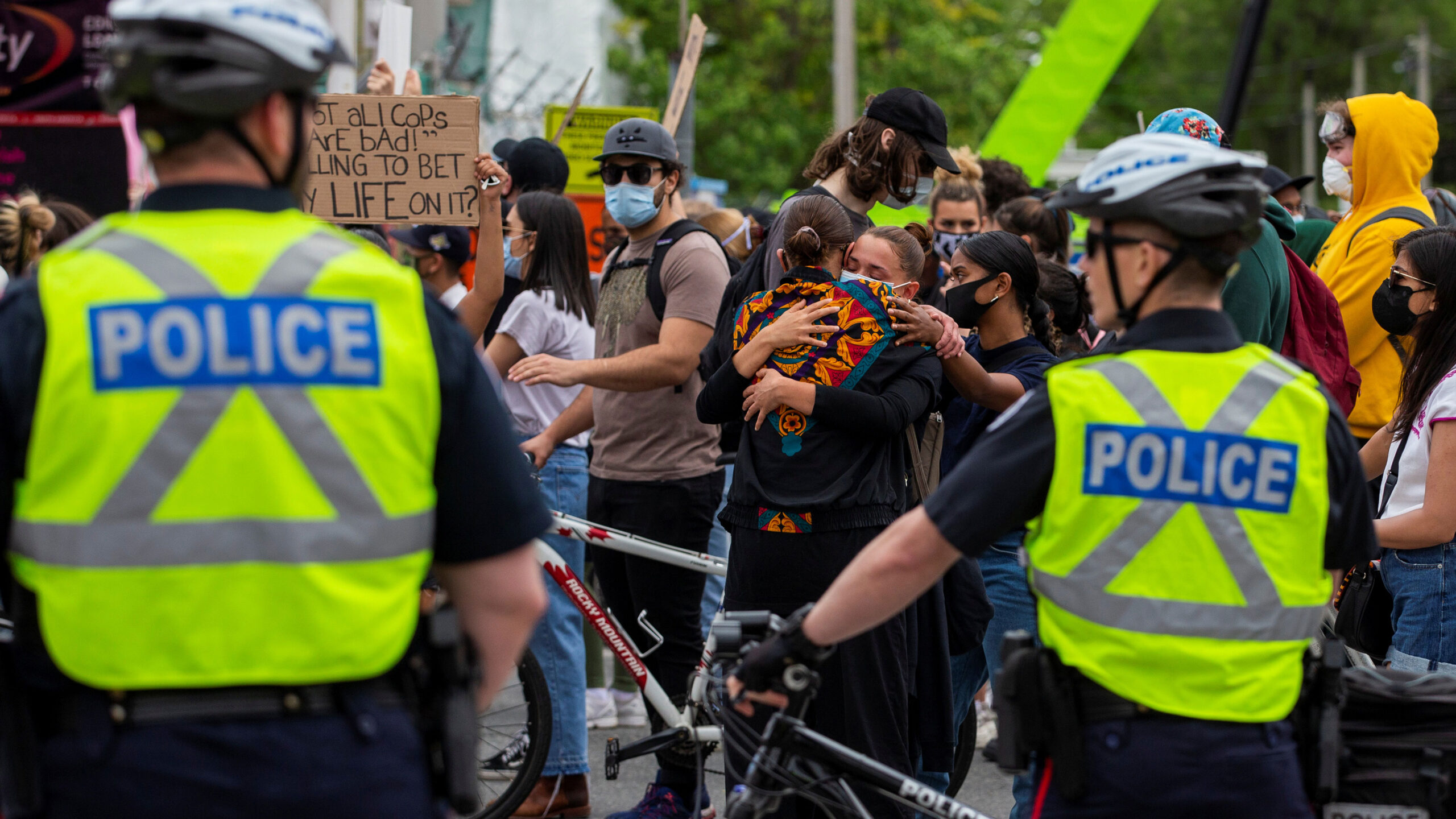
Lucy Lau
A city council motion proposing a reduction in Toronto Police’s operating budget has been revised to include a ban on deadly force and military-style weapons.
But one advocate says the city’s police services must be “reimagined” altogether to better protect Black and Indigenous people.
The motion, put forth on June 8 by Toronto-St. Paul’s Councillor Josh Matlow and seconded by Toronto Centre Councillor Kristyn Wong-Tam, originally sought to reduce next year’s policing budget by 10 per cent.
It now requests the Toronto Police Services Board propose a 2021 budget of around $1.1 billion, which is “a minimum of 10 per cent lower than the 2020 approved budget,” Matlow said.
The money would be reallocated to social services.
It also requests banning the use of deadly force and military-style weapons on unarmed civilians and the replacement of armed police officers with community-based crisis programs to deal with calls involving issues such as mental health and homelessness.
Matlow said he made these revisions to “leave room for negotiations to make far more transformative changes to how policing is done.
“I want us to be willing to change the way that our communities are served and supported,” he said.
The motion seeks to “wrest control of the police budget” by giving council the ability to approve or disapprove where police allocate funds.
Matlow said, right now, the city has the power to approve the total budget, but Toronto Police Service decides how the money is spent.
“Somehow, the police operating budget is untouchable. That’s not acceptable,” he said.
The motion requests funding be reallocated to programs that “enhance resiliency in marginalized communities,” such as anti-racism education and affordable housing.
A 10 per cent reduction in the 2021 police budget would result in about $122 million of savings. But Matlow said council usually resists cutting police budgets.
Matlow said the motion will “at the very least open the door to finally, seriously moving money from the police budget and into alternatives to policing.”
The motion was introduced following the death of George Floyd, which has sparked ongoing protests against anti-Black racism and police brutality around the world.
“I’ve learned that defunding the police may actually make our communities safer for Black, Indigenous and people of colour, who are not safe due to the fact that we have so much policing and the way that it’s modelled,” Matlow said.
Defunding police has ‘no merit’
Mike McCormack, president of the Toronto Police Association, calls the motion “political grandstanding.”
He said debates surrounding police reform have “no merit” and funding cuts will not improve police services.
“To me, it’s an emotional reaction to what the climate is right now,” McCormack said. “And I’m always very concerned that politicians are making kneejerk motions and motions that don’t appear to be thought out.”
He said Toronto Police are “not immune” to systemic racism but maintains the service does not have an issue with excessive force.
He said the city needs to invest in community-based policing programs to “break down barriers” and build trust between officers and vulnerable communities.
“Adjusting the way that we police is a necessity to ensure that we continue to have this dialogue and make the changes we need based on facts and evidence,” McCormack said.

Trying to ‘re-envision’ the role of policing
Dr. Siham Rayale, chair of the Black Muslim Initiative, says defunding police is a good first step but not enough.
She said the motion to reallocate the Toronto Police budget and ban the use of deadly force needs to be accompanied by actions that directly address systemic racism in both the police system and society at large.
“I think reform right now is too much of a buzzword that doesn’t really address the underlying causes of anti-Black racism and structural racism that significantly impacts Black communities and Indigenous communities,” Rayale said.
She said if money is reallocated, it needs to be used to develop “culturally competent” services, such as youth and mental health programs, where workers have undergone anti-racism and anti-oppression training.
Engaging communities and ensuring residents have a say in where funds are directed is also key, Rayale said.
“We know participatory budgeting, as a tool in a strategy, works in being able to uplift communities,” she said. “Because the communities themselves are participating in the development of where those services go.”
Rayale said the city needs to ask what policing means and why and how certain communities are over-policed.
She said these questions reveal the systemic and anti-Black racism embedded in Toronto’s police service and asking those questions is the first step in fixing a system that’s long been “broken.”
“We’re not even working backwards and we’re not even going forward. We’re trying to completely re-envision what the role of policing should be,” Rayale said.
She said the Black Muslim Initiative, which advocates against anti-Black racism and Islamophobia, is “watching” council’s proposed motion to ensure it betters the lives of Black Muslims in Toronto.
“We’re talking about things that impact everyday lives. They’re not abstract ideas,” Rayale said.
The motion to reduce the police budget by 10 per cent is on the agenda for this month’s city council meeting on June 29 and 30.


